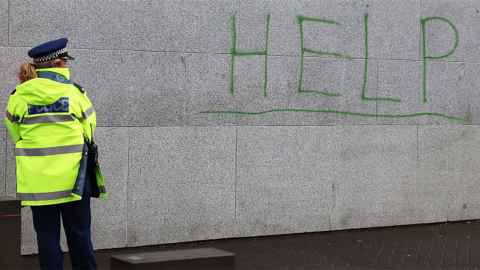We can’t sing redemption songs quietly
14 September 2020
Opinion: As the gale of global inequity gains strength, social workers need to hang onto a sense of individual and collective balance, writes Ian Hyslop.

These disturbing times are bringing out the best and worst of the human condition.
The mounting social disruption and economic fall-out from the pandemic is severely troubling a world already severely troubled by the cumulative fall-out from global warming. The future as we have understood it in the main-stream Western narrative of progressive development no longer makes sustained sense – unless, perhaps, to the hyper-wealthy.
It is raining stones on working people the world over. This time of insecurity and uncertainty has generated political instability of all shapes and hues: the rise of right-wing populist movements in Europe and the USA – and the politics of revolutionary and/or liberal social change seen in the civil dissent of the BLM movement, or the protests against corrupt post-Soviet governments in northern Europe. And we are seeing reactionary crack-downs and secret police activities sanctioned by repressive regimes under threat.
Politics has become a marketing game under late liberal capitalism. In Aotearoa New Zealand we have a centrist Labour Party in the tradition of soft neoliberalism. Socialism with a big or small ‘s’ is never mentioned unless it wakes the ghost of Labour past and propels ‘middle New Zealand’ into the hands of Judith Collins and her clear messages of conservatism, business, profit and order.
Social justice and redemption songs are as old as the hills, but they still need to be belted out. There is plenty work to do and plenty of illusions to dispel. Don’t let the bastards tell you there are no truths.
Our own dystopian leanings are, of course, dwarfed by the post-truth tsunami which is the stock and trade of the Trump presidency. Trump both exploits and generates the paranoia of the times. There really are self-appointed (and armed to the teeth) militia patrolling the streets of southern US cities. Self-feeding fear and twisted simplistic patriotism is good for Trump. He seeds and harvests it like an egocentric child in a bountiful toy shop.
So, yes, these are bizarre and difficult times for many, and it is very important for us to try and keep our heads on straight. Social workers – or at least social work organisations – seem to like to think of themselves in ways that romanticise the past and present function of the profession. The fairness and care we aspire to is often quite different from the practice environments that we operate within.
The profession flourished in the welfare state era, although the outcomes of our interventions were not always in the interests of the under-class poor that we targeted. New Zealand’s white working man’s welfare state had its own wider deficiencies of course, but (importantly) the political consensus was about the state buffering the poverty capitalist markets produce. This vision has come undone more than a little over the last 30 years.
The dominant ideology of equality for all delegated social work the job of picking up those pushed aside by an economic system which was based on economic self-interest. Now, of course, self-interest is the dominant (if disguised and confused) ideology and social work is increasingly about cost-effective discipline of the disadvantaged. This is something that we can, do, and must continue to challenge as and when we can.
Social work (and progressive collective re-distributive politics in general) does have trouble finding a place to stand in the current storm. Where does this leave us as we slog on into the wind? “Being kind” is soothing and simplistic Jacinda, but it isn’t enough. The thing is – I think – not to despair, not to be too naïve and to hang on to our role as people who question the narratives we are fed – including the stories we tell ourselves.
There are some definitive social realities in liberal capitalist societies that social workers get a clear view of – we see how unequal relations of power and privilege are played out in people’s lives. This is about the distribution of wealth and the result of how ownership and control over production and profit is arranged in our economic system. In Aotearoa New Zealand it is also about the living legacy of colonisation. Individual and family troubles are embedded in wider economic and structural issues.
Good social work is valuable, skilled and difficult. It has always needed more than a bit of courage and grunt. We walk the bridge between private troubles and economically generated suffering, and we need to hang onto our sense of individual and collective balance as the gale of global inequality rises. We need to challenge each other and look after each other. Social justice and redemption songs are as old as the hills, but they still need to be belted out. There is plenty work to do and plenty of illusions to dispel. Don’t let the bastards tell you there are no truths.
This opinion piece was first published by the RSW Collective
Dr Ian Hyslop is a senior lecturer in the School of Counselling, Human Services and Social Work, Faculty of Education and Social Work.
This article reflects the opinion of the author and not necessarily the views of the University of Auckland.
Used with permission from Newsroom We can’t sing redemption songs quietly 14 August 2020.
Media queries
Alison Sims | Research Communications Editor
DDI 09 923 4953
Mob 021 249 0089
Email alison.sims@auckland.ac.nz